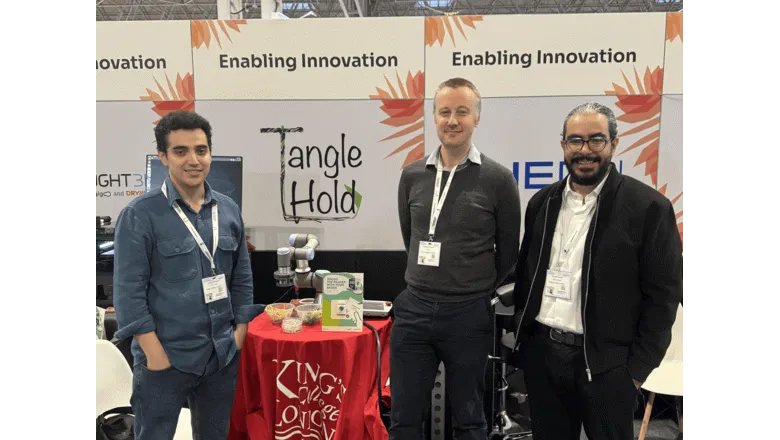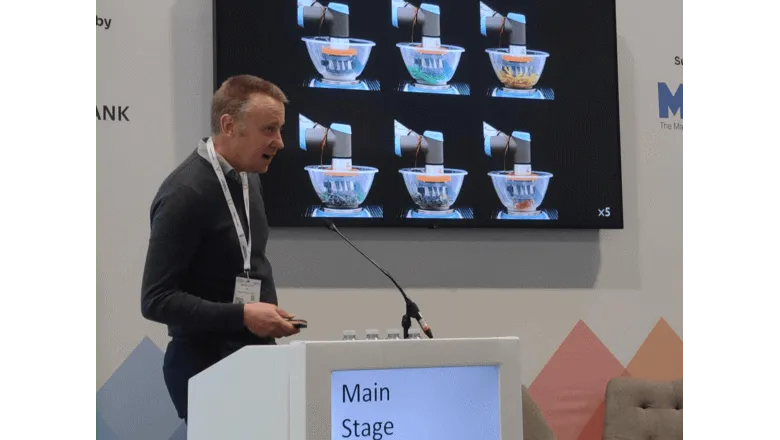As agricultural businesses rush to make up labour shortages with recruitment agencies, the extra costs they take on get passed on to people’s wallets. These robots could help businesses deliver fresh fruit and veg to shops cheaply, and offload manual labour from agricultural jobs to instead tap into the workforce’s expertise in different ways.”
Dr Matthew Howard
05 November 2024
King's gets hands-on with industry at Advanced Engineering
A delegation from the Department of Engineering showed off their latest product to over 400 leading manufacturers.

A team of academics and PhD students wowed industry investors at last week’s Advanced Engineering show at the Birmingham NEC, where they showed their design for a new robotic gripper to engineers at firms like IBM, Jaguar-Land Rover, BMW and others.
Dr Matthew Howard, joined by PhD students Ashkan Rezanejad and Mostafa Mousa, presented a prototype of a robotic gripper (patent pending) that can handle fresh produce and herbs to the show floor in a bid to encourage companies to invest in their commercial spinout.
The economic dislocation caused by recent events such as the COVID-19 pandemic have meant that the time-sensitive handling of fresh produce has faced a major labour shortage, with 86% of horticultural companies reporting shortfalls in recruitment, a major driver of food price rises.
Automation has long been seen as a major need in the sector, but traditional methods of robotic gripping and picking that have relied on suction cups have fallen short. While these can be used for hard objects with a smooth surface, like a courgette, they struggle with soft, tangle-prone objects like fresh herbs, or the kind of mesh bags used to package fruit.
The new design, produced by Drs Matthew Howard, Antonio Forte and students Ashkan and Mostafa, uses a new kind of synthetic material that uses tangling to pick items with minimal need for sensing, control or power. By offloading the tools the robot needs to control its movement into its hardware, the designers could remove the need for expensive cameras and sensing software seen in other areas of robotics, like next-gen prosthetics.
Dr Howard said, “As agricultural businesses rush to make up labour shortages with recruitment agencies, the extra costs they take on get passed on to people’s wallets. In an aging world, these physically strenuous and repetitive jobs can also be physically damaging for a smaller and smaller rural workforce.

“These robots could help businesses deliver fresh fruit and veg to shops cheaply, and offload manual labour from agricultural jobs to instead tap into the workforce’s expertise in different ways.”
Supported by the King’s Spinout Accelerator and NMES Enterprise Team, the patent is shared equally between all designers of the technology who are all involved in its commercial spinout, tentatively called ‘The Weird Gripper Company’.
By linking together students at the beginning of their career to industry investors looking for innovative solutions to transform their business, the team also hope that this can be a mentoring experience to sharpen young scientists’ entrepreneurial skills.
In January, King’s will also be hosting the 6th UK Robot Manipulation Workshop, where they’ll be presenting a demo of their device to industry and academic partners.
Work with the NMES Enterprise Team
Been inspired to start a spinout of your own? Think you’ve got the best idea since sliced bread? The NMES Enterprise team supports academics make connections with industry and commercialisation accelerators to ensure your ideas for a business get the help they deserve.
Learn more about what an industry partnership can do for you at: nmes-enterprise@kcl.ac.uk



